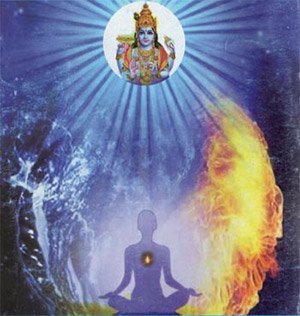Siddhanta Sangraha of Sri Sailacharya
by E. Sowmya Narayanan | 2008 | 30,562 words
Siddhanta Sangraha Chapter 11 (English translation), entitled “time” as included in the critical edition and study. The Siddhanta Samgraha is a Sanskrit philosophical text dealing with Vishishtadvaita in five hundred Sanskrit verses. It was written by Shri Shailacarya (18th century) and closely follows the philosophy of Vedanta Deshika (13th century).
Chapter 11 - Time
116. Brahman is not subject to any modifications or change in any state. It is replied through an analogy that a jar or a pot with water when carried it is the person who carries the water is ‘really’ carries that though the pot holds the water. In the same way, a part of Brahman’s body alone gets modified. Hence, therefore the Brahman is indirectly reffered as the material cause. Kāla (time) is the substratum (aśraya) for the modifications such as seconds (kṣaṇa), day, night etc
117-118. It acts as an aid to all the substances which are its effect. It has various modifications such as muhurtha etc. Without the association of time there will not arise any cognition of any objects.
119. It always acts as an adjectival feature, with which it is associated, as in the statements ‘idānīm ghaṭaḥ idhānīm paṭaḥ’. Therefore time does not require any pramāṇa to prove its existence. The directions such as east, west etc. are not the separate substances.
120. It is because of the substances which serve as adjuncts, become the usages such as east, west etc. The statements such as ‘the directions are originated’ etc., is to be understood as a result of the limiting adjuncts which are the substances of corporal form.
Conclusion:
 This concludes Time according to Vishishtadvaita philosophy explained by Shri Shailacarya. This book follows the model of Vedanta Deshika although the Vishishta Advaita school was originally expounded by Shri Ramanuja. Vishishta-Advaita is one of the various sub-schools of Vedanta which itself represents one of the six orthodox schools of Hindu Philosophy. They highlight the importance of the Upanishads, the Bhagavad Gita and the Brahma Sutras.
This concludes Time according to Vishishtadvaita philosophy explained by Shri Shailacarya. This book follows the model of Vedanta Deshika although the Vishishta Advaita school was originally expounded by Shri Ramanuja. Vishishta-Advaita is one of the various sub-schools of Vedanta which itself represents one of the six orthodox schools of Hindu Philosophy. They highlight the importance of the Upanishads, the Bhagavad Gita and the Brahma Sutras.
